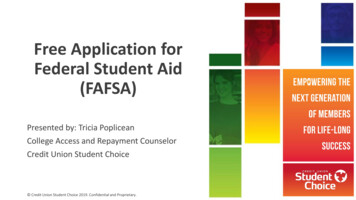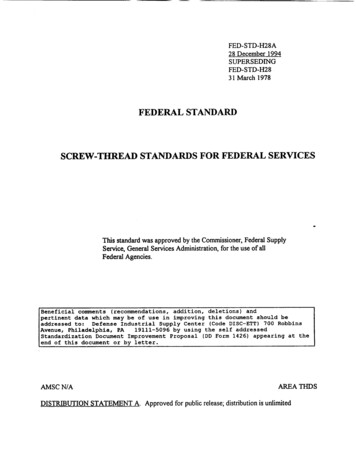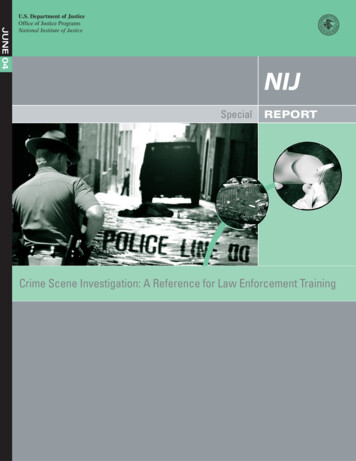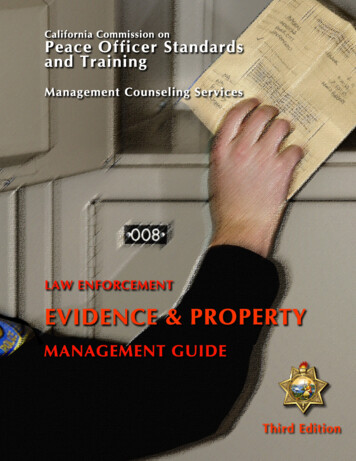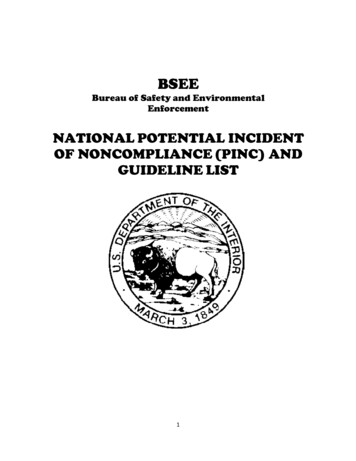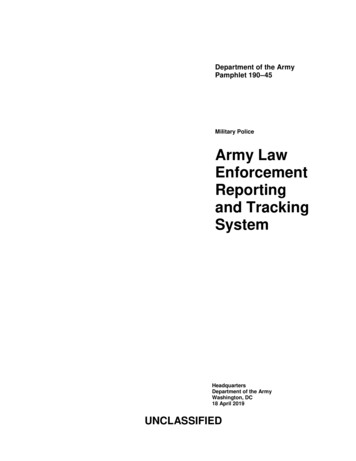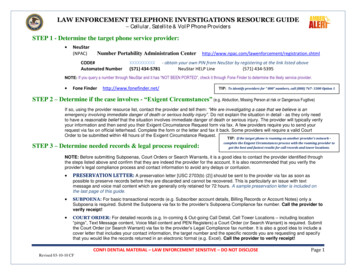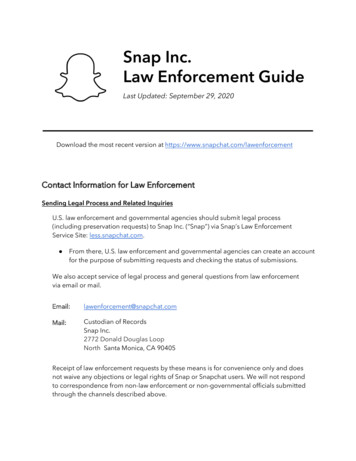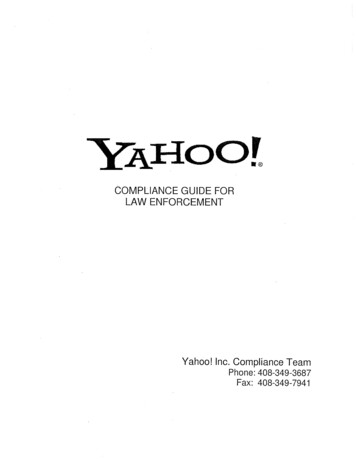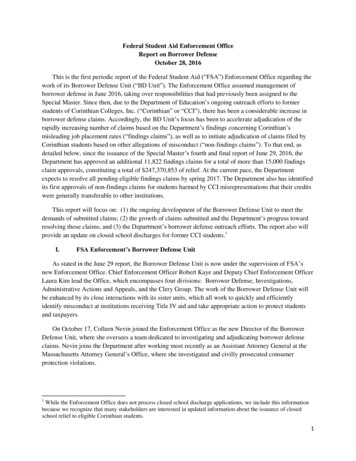
Transcription
Federal Student Aid Enforcement OfficeReport on Borrower DefenseOctober 28, 2016This is the first periodic report of the Federal Student Aid (“FSA”) Enforcement Office regarding thework of its Borrower Defense Unit (“BD Unit”). The Enforcement Office assumed management ofborrower defense in June 2016, taking over responsibilities that had previously been assigned to theSpecial Master. Since then, due to the Department of Education’s ongoing outreach efforts to formerstudents of Corinthian Colleges, Inc. (“Corinthian” or “CCI”), there has been a considerable increase inborrower defense claims. Accordingly, the BD Unit’s focus has been to accelerate adjudication of therapidly increasing number of claims based on the Department’s findings concerning Corinthian’smisleading job placement rates (“findings claims”), as well as to initiate adjudication of claims filed byCorinthian students based on other allegations of misconduct (“non-findings claims”). To that end, asdetailed below, since the issuance of the Special Master’s fourth and final report of June 29, 2016, theDepartment has approved an additional 11,822 findings claims for a total of more than 15,000 findingsclaim approvals, constituting a total of 247,370,853 of relief. At the current pace, the Departmentexpects to resolve all pending eligible findings claims by spring 2017. The Department also has identifiedits first approvals of non-findings claims for students harmed by CCI misrepresentations that their creditswere generally transferable to other institutions.This report will focus on: (1) the ongoing development of the Borrower Defense Unit to meet thedemands of submitted claims; (2) the growth of claims submitted and the Department’s progress towardresolving those claims; and (3) the Department’s borrower defense outreach efforts. The report also willprovide an update on closed school discharges for former CCI students.1I.FSA Enforcement’s Borrower Defense UnitAs stated in the June 29 report, the Borrower Defense Unit is now under the supervision of FSA’snew Enforcement Office. Chief Enforcement Officer Robert Kaye and Deputy Chief Enforcement OfficerLaura Kim lead the Office, which encompasses four divisions: Borrower Defense, Investigations,Administrative Actions and Appeals, and the Clery Group. The work of the Borrower Defense Unit willbe enhanced by its close interactions with its sister units, which all work to quickly and efficientlyidentify misconduct at institutions receiving Title IV aid and take appropriate action to protect studentsand taxpayers.On October 17, Colleen Nevin joined the Enforcement Office as the new Director of the BorrowerDefense Unit, where she oversees a team dedicated to investigating and adjudicating borrower defenseclaims. Nevin joins the Department after working most recently as an Assistant Attorney General at theMassachusetts Attorney General’s Office, where she investigated and civilly prosecuted consumerprotection violations.1While the Enforcement Office does not process closed school discharge applications, we include this informationbecause we recognize that many stakeholders are interested in updated information about the issuance of closedschool relief to eligible Corinthian students.1
In addition, to meet the rapid increase in claims, the BD Unit also recently added contract attorneysand analysts, on a temporary basis, to assist with ongoing claim review. These additional resources havecontributed to the Unit’s substantial progress resolving claims.II.Borrower Defense Claimsa. Claims ReceivedAs a result of the ongoing outreach efforts to borrowers detailed below, the Department has seen alarge increase in the number of claims submitted. Significantly, the recent postal mail campaign toEverest and WyoTech borrowers nearly doubled the total number of claims received. The Department hasnow received a total of approximately 82,000 claims.2 Once a claim is submitted and processed throughintake, borrowers’ loans are placed in forbearance or stopped collections until their claim is resolved,unless they opt-out.3Based on the number of claims that have been processed through intake, approximately 60% of theCorinthian claims have been filed by borrowers who enrolled in CCI schools during the time periodscovered by the Department’s findings. Many of these claims are from borrowers who attended programsthat the Department found had been publicized with misleading job placement rates. All of these claimsthat are not granted on the basis of the Department’s findings will also be reviewed to determine whetherrelief is warranted on other bases. We also have more than 4,000 pending applications from borrowerswho attended non-CCI schools.b. Claims Adjudicatedi. Corinthian Findings ClaimsAs of the last report on June 29th, the Department had approved a total of 3,787 claims based on theDepartment’s findings. As of October 12, the Department has approved an additional 11,822 findingsclaims. Details on the amount of the discharges associated with these claims are in the table below.Assuming the current rate of approval is sustained, the Department expects to resolve all pending eligiblefindings claims by the spring of 2017.SchoolFindings Claims Approved forDischarge through 6944Total Amount of LoansApproved for Dischargethrough 10/12/16 104,085,830 116,874,687 26,410,336 247,370,8532This total number may include some duplicate or incomplete claims that will not be identified until all of theclaims have been processed through intake.3Note that, in limited circumstances, borrowers will not be placed in forbearance because they are still in their graceperiod, or otherwise in a status where forbearance would not be beneficial.4This number is higher than the total number of findings applications approved because some borrowers attendedmultiple schools.2
ii. Corinthian Non-Findings ClaimsIn addition to this significant progress on findings claims, the BD Unit also has made progress on thepending non-findings claims submitted by former Corinthian students. The BD Unit has conducted athorough investigation into the practices of Corinthian personnel, including reviewing thousands of pagesof internal documents, documents obtained from other state and federal agencies, publicly availabledocuments, as well as the personal narratives contained in thousands of borrower defense applications.Based on this work, the BD Unit has identified the most common categories of claims made by CCIborrowers and whether and under what circumstances borrowers should qualify for relief on the basis ofthe claim. While these efforts are ongoing, the Department is now prepared to issue relief for the firstcategory of such claims.At the time of this publication, the BD Unit has identified 293 claims for approval on the basis ofmisrepresentations CCI made about the general transferability of its credits. These applicants will beeligible for relief subject to the applicable state statute of limitations. Although this is a limited numbercompared to the universe of claims, additional claims alleging this misrepresentation will now beprocessed for relief.iii. Denial of Claims Not Eligible for Borrower DefenseFinally, in addition to the approvals noted above, the BD Unit also has resolved 245 claims that donot qualify for relief. These claims are being denied because the claims are not eligible under theDepartment’s findings (e.g., the applicants did not enroll during the findings time periods or did not enrollin eligible programs) and do not allege any other basis for borrower defense relief. The Department willinform these borrowers of the basis for the denial. The Department also will inform borrowers that theymay re-apply if they have new information bearing on their claim or if they would like to allege anotherbasis for relief not included in their original application. The Department also is updating its borrowerdefense hotline to ensure that it can assist these borrowers who may have questions about their loans orthe status of their loan forbearance. In addition, for any of these borrowers who may also be eligible forclosed school discharge, the Department will inform them of their potential eligibility.III.Outreach to Potentially Eligible Corinthian BorrowersThe Department has pursued various methods to inform borrowers that they may be eligible forborrower defense relief and other forms of loan discharges. In addition to accelerating its adjudication ofclaims, the Department has expanded its direct outreach to potentially eligible Corinthian borrowers whohave not yet submitted applications. As detailed below, this ongoing work includes expanded postal mailoutreach, a Facebook advertisement pilot, a servicer pilot that relies on emails, postal mail, phone calls,and texts, an outreach partnership with state attorneys general, and publication of a new “universal form”for public comment. The Department expects that the finalization of the universal form will facilitatefuture outreach and educational efforts to borrowers who may be eligible for borrower defense relief.Finally, the Department also has made considerable efforts to inform students of recently closed schoolsabout their options, whether through transfer or closed school discharge.3
a. Postal Mail CampaignSince the last borrower defense report, the Department completed its postal mail campaign to over280,000 Everest and WyoTech borrowers who enrolled between 2010 and 2014, the period covered bythe Department’s findings. The Department estimates that this postal campaign yielded over 30,000additional borrower defense applications.b. Facebook PilotThe Department also has experimented with new types of outreach. The Department recentlyconducted a pilot that deployed 219,000 Facebook ads to users who had expressed an interest in HealdCollege, one of the Corinthian schools. For example, the pilot directed ads to users who had indicatedthey attended Heald College. Evidence from the pilot suggests that this type of outreach may be effectiveto direct certain borrowers – including those relying on mobile devices – to relevant information on theDepartment’s website. The Department continues to evaluate the appropriate circumstances for this typeof outreach to borrowers.c. Servicer PilotAdditionally, the Department is launching an outreach pilot with all of its servicers. Through thepilot, each servicer will communicate with a subset of Corinthian borrowers using emails, letters,outbound calls, or texts. The pilot will help the Department determine the efficacy of each of these modesof communication, as well as whether emails and letters from the servicer may be more effective forreaching eligible borrowers than communications directly from the Department. The results of this pilot,which we expect to have this winter, should provide the Department with information to guide its futureoutreach to students from other institutions.d. Partnership with State Attorneys GeneralIn addition to these internal efforts, the Department also is working closely with state attorneysgeneral from across the country to conduct outreach to former CCI students from their states. These 42state partners, as well as the Attorney General of the District of Columbia, will use a variety of methods –including email, postal mail, telephone calls, and events – to reach more Corinthian borrowers. TheBorrower Defense Unit would like to especially thank the Illinois and Maryland Attorney General’sOffice for their leadership and coordination of these efforts, as well as the Massachusetts AttorneyGeneral’s Office, which has already gathered and submitted a large number of claims from borrowerswho attended campuses in Massachusetts. The BD Unit thanks all of these state partners for theircommitment to helping the eligible borrowers in their states.e. Universal FormThe Department is in the final stages of developing a “universal form” that would provide moreguidance to all borrowers on how to apply for borrower defense. The Department revised the form basedon the many useful comments received through the first round of required Paperwork Reduction Actclearance and, as of October 17, 2016, is in its second round of comments f/2016-23400.pdf). The Department expects to publishthe final form along with additional guidance about the application process on its website later this year.4
As noted in the last Special Master report, the universal form also will include detailed informationspecific to FFEL borrowers. In the meantime, eligible students should visit StudentAid.gov/borrowerdefense to learn what to include in a borrower defense submission and how to submit an application.Application materials may be submitted via email to FSAOperations@ed.gov or by mail to: U.S.Department of Education, PO Box 429060, San Francisco, CA 94142.IV.CCI Closed School ClaimsAlthough it has now been more than a year since the April 27, 2015 closure of Corinthian schools, theDepartment continues to process claims from former Corinthian students that opt to pursue a closedschool discharge. The Department last reported that, as of June 24, CCI borrowers had filed 12,254applications for closed school relief, of which 7,386 were eligible, resulting in 97,613,625 of relief toborrowers. As of October 12, there are now a total of 13,010 closed school discharge applications thathave been received, resulting in 7,858 approvals, for a total of 103,050,594 of relief granted.Approximately 189 closed school discharge applications are pending. To date, 4,963 applicants for closedschool discharge (38%) have been denied relief, most commonly because: (1) the application wasincomplete; (2) the borrower withdrew from their program prior to the June 20, 2014 deadline; or (3) theborrower completed their program of study (either at the closed school or another school to which theywere able to transfer their credits). The chart below shows the number of claims granted by school.SchoolHealdEverestWyoTechTotalApplications Receivedas of October 87,6233,9291,45813,010Applications Grantedas of October 125,0622,2825147,858Total Loans Approvedfor Discharge 73,321,497 25,544,812 4,184,285 103,050,594The Department is also taking steps to ensure that all Corinthian borrowers who are eligible for aclosed school discharge receive that discharge. Through the Borrower Defense final rule, the Secretary isexercising his authority to implement new and amended regulations specific to automatic closed schooldischarges on a faster timeline than other elements of the new regulation. As a result, all Corinthianborrowers who may be eligible for closed school discharge stand to benefit from a streamlined dischargeprocess over the next year.V.ConclusionAdjudicating borrower defense claims is an important part of the Department’s ongoing efforts toprotect students and ensure greater accountability among institutions receiving federal student aid. Whilethe Department has laid a strong foundation for this process, much work remains ahead — not only forformer Corinthian students but also for students subject to misconduct by other institutions. This workincludes implementation of the Department’s final Borrower Defense rule, which goes into effect on July1, 2017, and creates a new federal standard for borrowers whose loans disbursed on or after that date. TheEnforcement Office looks forward to working with its stakeholders to ensure that the BD program fulfillsits mission and the important goals of the new regulation. To that end, the Enforcement Office willcontinue to publish periodic reports on the Borrower Defense program and its work on behalf of studentsand taxpayers.5
conducted a pilot that deployed 219,000 Facebook ads to users who had expressed an interest in Heald College, one of the Corinthian schools. For example, the pilot directed ads to users who had indicated they attended Heald College. Evidence from the p

